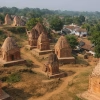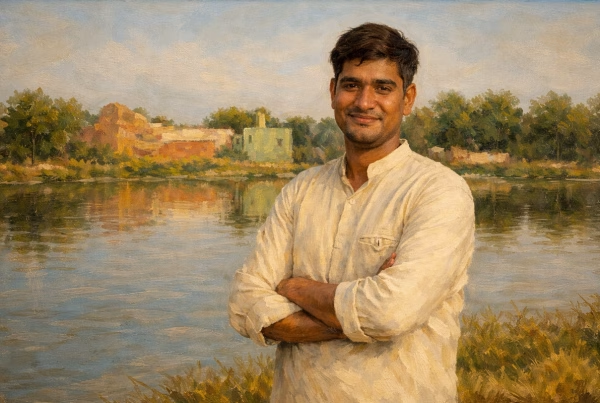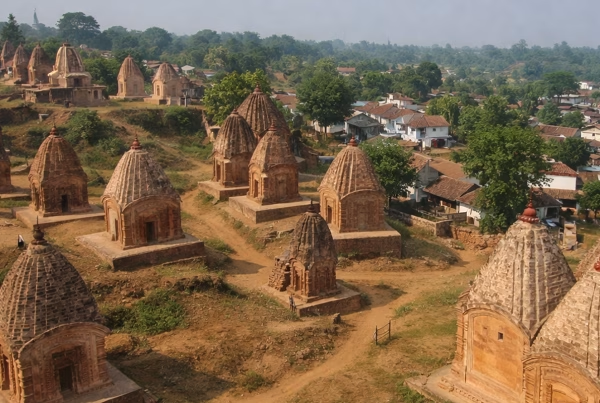Every October, when Sharad Navratri arrives, Telangana blossoms in a way no other region does. The air fills with the fragrance of wildflowers, streets echo with songs, and women in vibrant saris gather in circles to honour Bathukamma festival. The word Bathukamma means “Mother, give us life”. At its heart, this is a festival of gratitude—to Goddess Gauri, to nature, and to community.
In a world where festivals are increasingly turning into loud processions with plastic and neon, Bathukamma stands apart. It is quiet yet powerful, simple yet profound—showing that devotion can be eco-friendly, beautiful, and deeply rooted in local identity.
The Story Behind Bathukamma
Bathukamma is dedicated to Goddess Gauri, seen as the embodiment of life, fertility, and strength. Folklore says she was created to protect women’s health and well-being. Every flower stacked in the Bathukamma pyramid becomes a prayer—for prosperity, protection, and longevity.
Unlike many festivals where rituals are led by priests, here it is the women who take center stage. They sing folk songs, clap rhythmically, and dance around the flower towers they themselves have created. The festival becomes a stage for both devotion and sisterhood, where faith is not imposed but shared.
The Nine Types of Bathukamma – From Purity to Abundance
Each of the nine days carries its own theme, reflected in the food offerings. Instead of a dry list, think of it as a story unfolding through flavors and symbols:
- Engili Pula Bathukamma begins the journey with sesame seeds and rice flour, invoking purity and strength.
- Atukula and Muddapappu Bathukamma bring in flattened rice and lentils, prayers for nourishment and health.
- Nanabiyyam and Atla Bathukamma celebrate fertility and festivity, offering soaked rice and small dosas.
- Vepakayala Bathukamma turns to neem fruit—bitter but healing—reminding everyone that even life’s hardships carry hidden protection.
- Venna Muddala Bathukamma sweetens the path with buttered rice balls, symbolizing comfort and love.
- Finally, Saddula Bathukamma arrives with varieties of rice dishes, marking abundance before the floral towers are immersed in water.
Together, these types of Bathukamma mirror the blessings sought from Maa Gauri—purity, health, fertility, healing, joy, and abundance.
The Flowers of Bathukamma – A Sustainable Offering
What makes Bathukamma visually unforgettable is its flowers. Tangedu, Gunugu, Banthi, and Chamanthi are not just chosen for their colors but for what they represent. Tangedu, with its golden bloom, is said to embody the strength of a lion; Gunugu carries softness and healing; Banthi and Chamanthi add brightness and resilience.
But there is something even more relevant today: Bathukamma is an eco-friendly festival. The flowers are wild, seasonal, and biodegradable. When the floral stacks are immersed in rivers or lakes on the final day, they dissolve naturally, enriching rather than polluting. Unlike plastic idols or chemical colors, Bathukamma shows us how devotion can exist in harmony with nature—a lesson worth remembering in an age of climate crisis.
Bathukamma as Telangana’s Identity
For Telangana, Bathukamma is more than a festival—it is cultural pride. It unites women across villages and cities, across age and background, into one circle of song and prayer. When Telangana became a separate state in 2014, Bathukamma was declared its official festival, almost as if the land itself was declaring its identity through flowers.
And the tradition has now traveled across the world. From the lakes of Hyderabad to Telugu communities in the U.S. and Europe, Bathukamma blooms wherever people carry memories of home. It has become a bridge between past and present, between homeland and diaspora.
Why Bathukamma Matters Today
In today’s times, Bathukamma is more than just ritual—it is relevance. It shows that:
- Community is strength: Women leading rituals and sharing spaces makes the festival inclusive and empowering.
- Nature is sacred: Choosing wild, local, biodegradable flowers teaches us sustainability without sermons.
- Identity is cultural: Bathukamma keeps alive regional pride while still connecting with the broader Navratri spirit across India.
At a time when festivals risk being reduced to noise, Bathukamma reminds us that faith can be quiet, communal, and kind to the planet.
The Bathukamma festival is Telangana’s gift to India—a festival where devotion wears the fragrance of flowers, where women’s voices rise in unison, and where nature is both honored and protected. From sesame seeds of purity to rice dishes of abundance, from neem’s healing to butter’s comfort, Bathukamma tells us that life is sacred in all its forms.
When the flower towers float away on the final evening, they leave behind more than petals on water. They leave behind a message: that culture and sustainability can bloom together.





